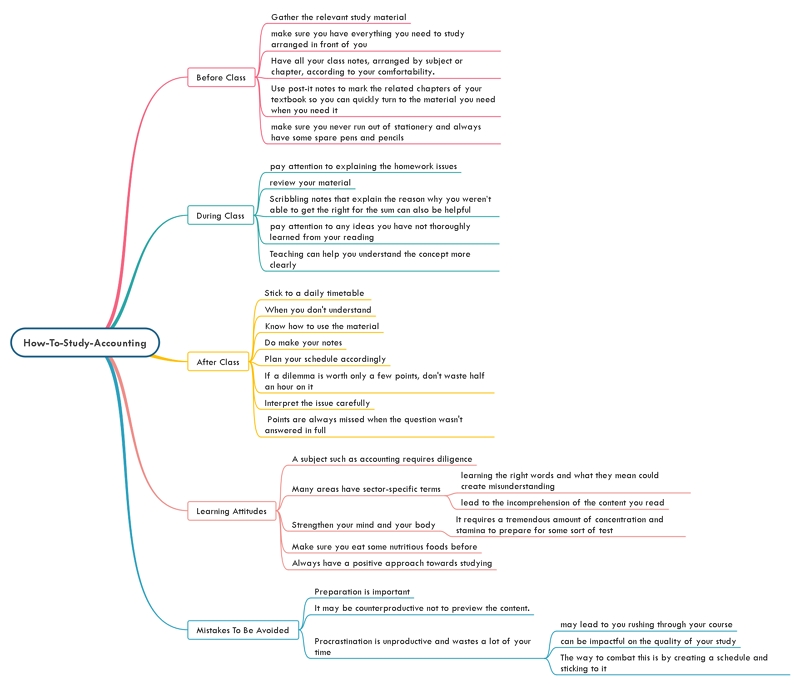Complete Guide To Study Accounting

Although there are many guidelines for the successful accounting analysis, learning to account begins with motivation and hard work. Studying accounting can be pure tedious if the heart is not in it. One important asset when it comes to how to study accounting,nbsp;is the ability to crunch numbers. Due to the rise in need of accounting experts, companies are searching for people with accounting expertise.
Getting a degree in an accounting course isn't straightforward, since it takes a lot of diligence and hard work. As in every other area of research, the amount of effort and commitment affects the results. There are some tips and tricks to help with studying for accounting.
There are many things to do before class to ensure a comfortable studying experience. Some of them are -
- Gather the relevant study materials and make sure you have everything you need to study arranged in front of you so that you don't have to have to delay your studies to find resources.
- Have all your class notes, arranged by subject or chapter, according to your comfortability.
- Use post-it notes to mark your textbook’s related chapters so you can quickly turn to the material you need when you need it.
- Also, make sure you never run out of stationery and always have some spare pens and pencils.
Accounting does not demand that you memorize key concepts and formulas for better results. However, it needs you to consider ‘why’ a particular concept is the way it is. Accounting is all about the ‘why.’ Explore the why behind what you are reading when you read your textbook. The primary aim is to understand the logic.
Throughout the class, pay attention to explaining the homework issues to the professor. If the homework responses do not fit your answers, review your material, and figure out why that was the case. Scribbling notes that explain why you weren’t able to get the right for the sum can also be helpful.
Furthermore, pay attention to any ideas you have not thoroughly learned from your reading or something the professor has mentioned that has not been included in the text.
Don't be shy about posing questions about things you don't understand. Teaching can also help you understand the concept more clearly.
During the examination period, many students face difficulties. Sometimes this is caused by insufficient planning for the exam or no training at all. How you prepare for this test is as critical as the assessment itself. By making sure of the following tips will prevent undue tension on the exam:
- Stick to a daily timetable
- When you don't understand, ask for help
- Know how to use the material
- Do make your notes
Concentrate on learning — not memorizing. Your teacher needs to see that you are thoroughly learning the accounting rules and topics learned in the course definition. This way, you know how to study accounting easily.
Key things to keep in mind during an exam:
- Plan your schedule accordingly.
- If a dilemma is worth only a few points, don't waste half an hour on it (regardless of how excellent the solution is, only those few points will always be worth it).
- Interpret the issue carefully. Points are always missed when the question wasn't answered in full.
- Preparation is important. All the material learned throughout the course is relevant, and learning how all of it works together can play a major role in how you interact with the material during the period.
- It may be counterproductive not to preview the content. Often people realize that taking the right notes would benefit them in the long run when it comes to review and analysis.
- Procrastination is unproductive and wastes a lot of your time. When you study accounting, you cannot afford to waste time. Perishing time is time you will never get back. This may lead to you rushing through your course, which can impact the quality of your study. The way to combat this is by creating a schedule and sticking to it.
- A subject such as accounting requires diligence and hard work to keep showing positive results.
- Many areas have sector-specific terms. Accounts are no different. Not learning the right words and what they mean could create misunderstanding and lead to the incomprehension of the content you read.
- Strengthen your mind and your body. It requires a tremendous amount of concentration and stamina to prepare for some sort of test.
- Ensure you eat some nutritious foods before and during that will help you stay smoother and more alert.
- Always have a positive approach towards studying and not treat it as something you ‘have’ to do but instead as something you ‘want’ to do.
Mind maps are a great way to help you study accounting. EdrawMind can be used to simplify studying accounting, here’s why -
- This easy-to-use, flexible mind mapping tool is designed to help you generate modern and fresh visuals. By combining your accounting concept’s bullet points into a mind map, EdrawMind lets you organize the concepts and create a map to study.
- EdrawMind can also help you map out concepts and also create a schedule for your study. It is incredibly resourceful when thinking about the logic of a problem.
Accounting is a discipline that requires both the theory and experience to operate with ease and conviction regularly. There is a wide range of accounting sector overall; financial accounting, public accounting, tax preparation, etc. Whatever industry you chose, putting these ideas into effect will help you have a better career.
With EdrawMind, you can quickly turn the accounting process into a map. The software provides 12 different map types, 33 themes, and more than 700 clip art materials to design the mind maps with almost unlimited possibilities. This way, you learn how to study accounting easily.






